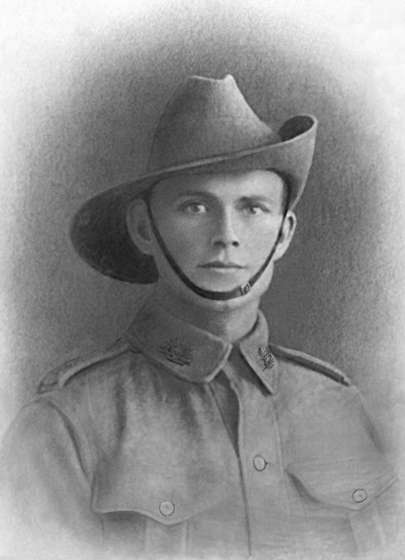

George Lavender BELL
Born 6 November 1885 in Govan, Lanarkshire, Scotland [28]
Son of Jane BELL [28]
His father's name was probably George LAVENDER based on his name and because he also used the surname of LAVENDER [20] [28]
In 1891 was living with his unmarried mother and grandfather John BELL at Glenwhilly Shepherds House in New Luce, Wigtown [20]
His mother married shepherd James MCFADYEN in 1898 in Inch, Wigtownshire, Scotland [28]
In 1901 he was living with his mother and stepfather at Glenwhilly Farm House in New Luce, Wigtownshire, Scotland [20]
Labourer in Coorow, Western Australia in 1913 and 1914 [50]
He may have lived with and worked for his uncle James MCGILL who was a farm manager in Coorow [19]
Resided in Coorow until enlisting in the Australian Imperial Force at Blackboy Hill on 2 September 1914 [30: item 3008521]
Gave his aunt Mrs Janet MCGILL as his next of kin, her address being Coorow and later the Perth suburb of Victoria Park [30]
Upon enlistment he was 5 feet 6 inches tall, weighed 127 pounds, and had blue eyes, brown hair and a fair complexion [30]
After brief training at Blackboy Hill he was on 6 October 1914 appointed to the Australian Imperial Force's 11th Battalion [30]
Embarked from Fremantle, Western Australia for active service abroad on the H.M.A.T. A11 Ascanius on 2 November 1914 [30]
Private 275 of the Australian Imperial Force's 11th Battalion in Egypt and Turkey during the First World War [30]
After further training embarked Alexandria, Egypt on the H.M.T. Suffolk for the Gallipoli Peninsula in Turkey [30]
Killed in Action on the day of the landing on the Gallipoli Peninsula with the 11th Battalion on 25 April 1915 [30]
Along with about 14 others he got to within three miles of Anzac Cove when they struck the main body of the Turkish Forces [18]
He was shot in the middle of his thigh and had his wound bound up by two of his companions when they had to retreat [18]
On retreating at 5 p.m. on 25 April 1915 he was left behind and was never seen again [18]
His aunt placed notices in The Sunday Times newspaper seeking information about him from his comrades [81: 17-Oct-1915, 26-Dec-1915]
He was listed as Missing in Action with hopes he'd been taken Prisoner of War until being certified as Killed in Action in 1919 [18] [30]
Following the discovery of his remains he was buried in 1919 at Plugge's Plateau Cemetery at Anzac in Turkey [18]
His effects consisting of a bible, damaged wrist watch, belt, lanyard, button and brush were sent to his aunt Mrs Janet MCGILL [30]
Three photos of his grave sent to his mother Mrs Jane MCFADYEN at Brighouse in Balmaclellan, Kirkcudbrightshire, Scotland [30]
His aunt Janet MCGILL planted a tree in his memory at Kings Park in Perth, next to one planted for his cousin Thomas MCGILL [P350]
He was one of 1,024 men from Western Australia who died at or as a result of the Gallipoli campaign during the First World War [357]
From The Sunday Times newspaper, Sunday 26 December 1915:
Soldiers Please Note
"Mrs J. McGill, of Coorow, will be grateful if any returned member of the 11th Battalion, 3rd Brigade, can give her any information concerning Private George Bell."
From The West Australian newspaper, Saturday 20 August 1921:
In Memoriam - Anzac Heroes
"McGill - In Loving memory of dear son and brother, private Thomas McGill, August 20, 1917; also our dear nephew and cousin, Private George Bell, killed at Gallipoli April 25, 1915. Dear boys, sadly missed."
| Reference: Carnamah Historical Society & Museum and North Midlands Project, 'George Lavender Bell' in Biographical Dictionary of Coorow, Carnamah and Three Springs, retrieved 3 February 2026 from www.carnamah.com.au/bio/george-lavender-bell [reference list] |
 |
Use the below form or email history@carnamah.com.au |




